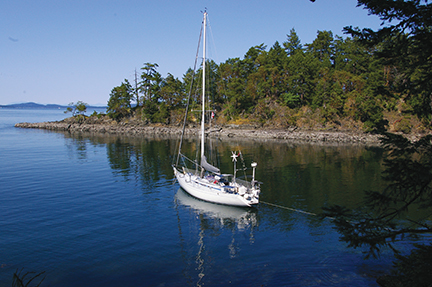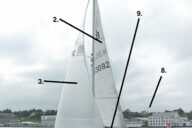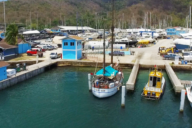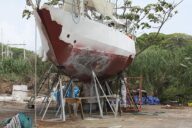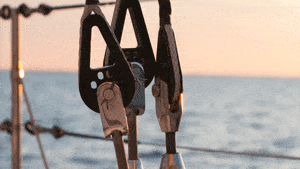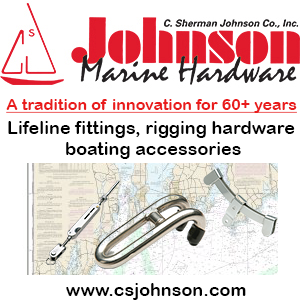Andy Cross reminds us that its always better to move sooner rather than later if not entirely happy with your anchoring situation. Previously published in BWS.
Wind whipped through Portland Island, B.C.’s tall, old growth forest as we hiked away from the anchorage towards the island’s interior. In the forest, the breeze abated and we explored fern-lined trails and mossy outcroppings for hours knowing that we’d left Yahtzee tucked into a good, protected spot to wait out the late fall gale sweeping in off the Pacific Ocean.
When we returned in the dinghy, the strong southeasterlies, coupled with an outgoing tide, had shifted us uncomfortably westward, too close for comfort to a rocky outcropping. Of course, the spot had seemed perfect when we dropped the hook and tied a stern line to shore in calm weather the day before, but when the wind picks up and the tide switches, everything can change.
Though we probably would have been fine, Jill and I stood for a moment on deck and assessed the situation before making the call to move, reset the hook and tie to a different spot on shore. Throughout our years of cruising and anchoring together, we’ve learned that if something doesn’t seem right or if we’re going to spend time worrying about it later, we might as well just move. It’s typically an easy call to make.
With her at the helm and me at the windlass, we dropped the stern line, powered away from the rocks and retrieved our anchor. Once the stern line was reeled back in and made ready to run free again, we scouted our options in the still blustery southeast wind. Needing to get our stern facing the breeze, we dropped our Rocna and 120-feet of 3/8s chain in the middle of the anchorage and backed towards a rock wall to take the stern tie to shore.
After getting set, we were riding more comfortably and in deeper water with our stern facing southeast into the gale and with the wind blowing over the tops of the trees and our mast. But with the gale set to veer south and then southwest overnight, I was weary of again being blown towards the shore in a cross breeze.
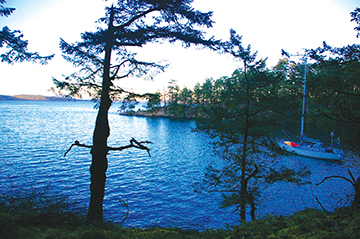 Enter the venerable stern anchor. To keep our stern out away from shore when the wind switched, I readied our stern anchor by flaking 200-feet of rode on deck, getting the big Danforth and 25-feet of chain in the bottom of the dinghy and rigging a trip line on a fender. With everything set to go, I rowed out abeam of the boat and dropped the anchor, chain and buoy to the south-southwest, making for a perfect angle to hold us when the wind switched.
Enter the venerable stern anchor. To keep our stern out away from shore when the wind switched, I readied our stern anchor by flaking 200-feet of rode on deck, getting the big Danforth and 25-feet of chain in the bottom of the dinghy and rigging a trip line on a fender. With everything set to go, I rowed out abeam of the boat and dropped the anchor, chain and buoy to the south-southwest, making for a perfect angle to hold us when the wind switched.
Back in the cockpit, we put the rode on a primary winch and pulled the anchor towards us and into a perfect mixture of small rocks and sand. It bit immediately.
Now, with our primary anchor set, a stern line set from the starboard corner of the stern to a ring on shore and our stern anchor set from the port corner, we comfortably sat without worry as gusts in the mid to upper 40s streamed over the anchorage throughout the night. And even with that much wind, it was a good night sleep—which is really all we could ask for.
Andrew, along with wife Jill and sons, are currently cruising the Pacific Northwest aboard their Grand Soleil 39. Follow their adventures at threesheetsnw.com/yahtzee

